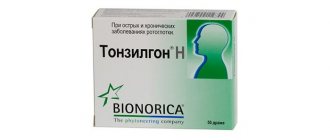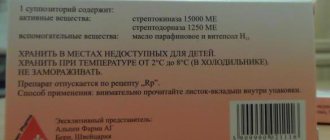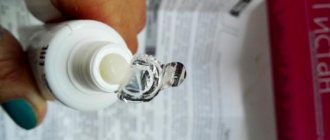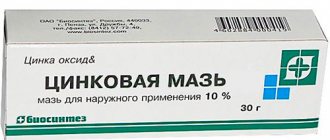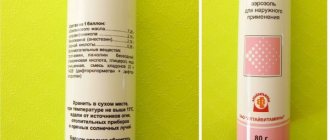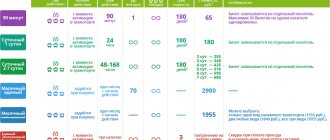Pregnancy and lactation are a special time in a woman’s life when all her strength and attention are focused on the baby. A young mother should not get sick, because there is a high risk of transmitting the infection to the child. At the first symptoms of ARVI, it is important to take action as quickly as possible, because with an advanced cold you will have to limit communication with the newborn, as well as take many medications for which breastfeeding is contraindicated. The use of Rinofluimucil during breastfeeding will help get rid of the disease at an early stage, without the need to stop feeding.
Composition of the drug and release form
| Drug substances | ||||||||
| Basic | Auxiliary | |||||||
| Acetylcysteine | thauminoheptane sulfate | water | ethanol | sodium hydroxide | mint flavor | sorbitol | ||
Dark glass bottle, volume – 10 ml, with a sprayer. Packed in a cardboard box.
Analogs
If nasal congestion persists or side effects occur, the drug can be replaced with drugs with similar effects:
- Vibrocil is a combined drug in the form of a gel, drops, spray, containing 2 components: phenylephrine and dimethindene maleate. Used to treat symptoms of rhinitis, sinusitis, otitis. For children under 1 year of age, only drops are used.
- Rinostop - nasal drops used for sinusitis, rhinitis, otitis media. The drug constricts blood vessels, as a result of which swelling decreases and breathing is restored.
- Isofra is an antibacterial drug and does not have a vasoconstrictor effect. Effective for diseases of the upper respiratory tract. The product should not be used in children under 1 year of age.
- Polydexa is a combined medication that has a vasoconstrictor, antibacterial and anti-inflammatory effect. It has a wide list of indications, so it is used to treat diseases of the nasal cavity, sinuses, and oropharynx.
- Nazivin is a vasoconstrictor that helps reduce swelling and reduce the amount of mucus discharge from the nasal cavity.
- Sinupret is a drug that comes in the form of drops, syrup, or dragees. Regardless of the form, Sinupret has anti-inflammatory, secretomotor, secretolytic effects. Contains plant components.
Read more Instructions for using Tobradex eye drops
Similar drugs should be selected by a doctor, depending on the disease and the cause of its occurrence.
Contraindications
The use of Rinoluimucil is contraindicated in patients with:
- thyrotoxicosis;
- intolerance to acetylcysteine, ethyl alcohol and thauminoheptane;
- angle-closure glaucoma;
- severe allergic reactions to mint.
Under the strict supervision of a specialist, the drug is prescribed to patients:
- under 3 years old;
- with diagnosed bronchial asthma;
- with extrasystole;
- with high systolic pressure syndrome, including a history.
pharmachologic effect
A drug with mucolytic and vasoconstrictor effects for use in ENT practice.
Acetylcysteine thins mucous and purulent mucous secretions by breaking the disulfide bonds of mucus glycoproteins. It also has anti-inflammatory (due to inhibition of leukocyte chemotaxis) and antioxidant effects.
Tuaminoheptane sulfate is a sympathomimetic amine that has a vasoconstrictor effect when applied topically. Eliminates swelling and hyperemia of the nasal mucosa.
Side effects
Exceeding the recommended doses may cause some side effects due to the vasoconstrictor effect of the drug:
- tachycardia;
- arrhythmia;
- pain in the nasal passages due to dry mucous membranes;
- allergic rash;
- tremor;
- overexcitement.
Using the drug for longer than the recommended period may lead to addiction.
How to treat a runny nose in a nursing woman?
Sneezing and nasal congestion are symptoms of an incipient cold. Timely treatment can stop the progression of the disease. In this case, powerful antiviral drugs and antibiotics, during which you need to stop breastfeeding, may not be necessary.
Treatment of rhinitis should begin with vasoconstrictors and nasal rinsing. Saline solutions are safe and therefore can be safely used for therapy in pregnant and lactating women, but you should be careful when taking vasoconstrictor drops and use them only under the supervision and prescription of a doctor.
Rinofluimucil is one of the few combination drugs that can be used during lactation without fear for the baby’s health. The spray is used for acute and subacute microbial rhinitis, seasonal, vasomotor rhinitis, inflammation of the paranasal sinuses.
Dosing regimen and method
The bottle is equipped with a nasal sprayer, which allows you to evenly cover the mucous membranes of the nasal passages with the drug. During injection, the bottle must be in an upright position.
For adults, 2 injections into each nostril are recommended, no more than 4 times a day.
Children over 3 years old - 1 injection into each nostril no more than 4 times a day.
The duration of the course should not exceed 5-7 days. If after completing this course the symptoms do not disappear, it is recommended to consult your doctor to change the drug.
Effective Application
The drug carries out its treatment with the help of acetylcysteine content, as well as with the help of tuaminoheptane. It is these components, which are the main ones in its composition, that are responsible for reducing certain swelling in some glandular formations.
If you are being treated with a drug such as Rinofluimucil, it is worth keeping in mind that it is very important to simultaneously find out from your doctor how to treat incipient sinusitis in other ways. Since you cannot rely only on this drug and take only it. Yes, it is strong, but alone it cannot completely affect the bacteria of the disease.
If the disease has already begun to develop, it is not always possible to cure it with Rinofluimucil alone.
This drug is available exclusively in spray form. It should be used intranasally. All adults and children can be treated with a drug called Rinofluimucil, but only if the children are over three years old. If one of the parents decides to treat the child with this remedy, it should be done in consultation with the doctor.
What are the symptoms of sinusitis in a 6-year-old child will become clear when you read this article.
Rinofluimucil can be used for no more than 7 days
Rinofluimucil should be used in both nostrils. But you need to know the dose, because it is selected individually for each person. For example, doctors recommend that adults use the spray three or four times a day. The injection into one nostril must be done twice in one approach. As for children, it is also necessary to apply three to four times a day, but the injection into one nostril must be done only once.
Treatment with the drug Rinofluimucil should not last more than a week. Otherwise, addiction to one of the components of this drug is possible. Only a doctor can prescribe treatment with Rinofluimucil for more than a week.
Once the spray bottle is opened, it must be used for no more than 20 days. After this period, the bottle can be thrown away. This is justified by the fact that the medicine will be unsuitable for use.
If a person who was prescribed treatment with Rinofluimucil was treated with it for more than a week or did not comply with the required dosage, the following side effects are possible:
- From the cardiovascular system: tachycardia, excessive heartbeat, arterial hypertension;
- From the central nervous system: tremor and excessive excitement;
- From the respiratory system: drying of the mucous membranes of the nose and mouth;
- From the genitourinary system: urinary retention and other diseases associated with the bladder.
How to properly use nasal spray for sinusitis and in what dosages will help you understand the content of the article.
Contraindications
Treatment of sinusitis may not be carried out with the drug Rinofluimucil if the patient suffers from a disease such as thyrotoxicosis and closed coal glaucoma. If a patient with sinusitis has a certain allergic reaction to this drug, it is also not recommended to use it. You should carefully take medications simultaneously with Rinofluimucil. You should definitely consult with your doctor.
How to properly treat sinusitis in a 3-year-old child, but in such a way as not to cause harm.
Pregnant women should not use rhinofluimucil
The use of such a remedy should be treated with the utmost care by those people who suffer from a certain type of asthma, angina pectoris, and especially arterial hypertension. It is not advisable for women to use the drug during pregnancy. Rinofluimucil can be used during pregnancy only if the doctor has agreed with the expectant mother.
How catarrhal sinusitis is treated with folk remedies can be understood from the article.
It is worth paying more attention to the use of this remedy in the treatment of illness in children. Children under three years of age are not recommended to use the product. It can only be used with the approval of your child’s doctor. It is strictly forbidden to self-medicate here.
After reading the article, it will become clear whether inhalations can be done for sinusitis or whether this procedure should not be done.
The cost of the drug Rinofluimucil in Russia is about 230 rubles.
Reviews
Evgenia, 26 years old, Yekaterinburg: “I bought the drug Rinofluimucil to treat sinusitis. I believe that this tool has both advantages and disadvantages. The advantages, of course, include properties that contribute to the rapid elimination of mucus in the nasal openings. I would like to include the high price as a disadvantage. Although it is worth noting that the price fully corresponds to the quality. I also don't like the fact that the shelf life of this drug is too short, only 20 days after opening. But he helps just great!”
Tatyana, 38 years old, Chelyabinsk: “I did not find any shortcomings of the drug. I am not at all bothered by the price and other minor drawbacks such as a short shelf life. Previously, I was treated only with antibiotics, but I decided to try drops once. And, oddly enough, they helped me a lot. Now I will use them more often, it’s a pity that I didn’t know about such a product earlier.”
Andrey, 42 years old: “This remedy actually treats, and does not just relieve the first signs of sinusitis, like many similar drugs. And I don’t throw away the product, I successfully use it the next time I have a runny nose.”
Video
Watch a video about effective ways to combat sinusitis:
Thus, Rinofluimucil is able to relieve swelling, facilitate nasal breathing, and as a result cure a runny nose, clearing the sinuses, and prevent the development of complications of sinusitis.
Source: - a medicinal drug that has a complex effect on diseases occurring in the nasal cavity. The product is not an antibiotic, although it has an anti-inflammatory effect.
Rinofluimucil is a nasal spray that has mucolytic and decongestant effects. Let's consider the effect of the main components that make up the drug.
- Acetylcysteine has a thinning effect on nasal discharge. The component gives a strong mucolytic result, due to which the mucus and pus that have formed in the nasal cavity are liquefied and eliminated. In this way, the patient’s condition is alleviated, and nasal breathing is restored. This component also acts as an anti-inflammatory and antioxidant agent. Acetylcysteine does not “know how” to fight bacteria and viruses, but it actively affects the source of inflammation, quickly eliminating it.
- Tuaminoheptane sulfate effectively removes swelling of the mucous membrane due to its vasoconstrictor effect, which quickly facilitates breathing.
Auxiliary components are the following:
- ethanol;
- water;
- mint flavor;
- sorbitol;
- sodium hydrogen phosphate dodecahydrate;
- sodium hydroxide;
- benzalkonium chloride;
- disodium edetate.
Indications
Instructions for use state that the drug has a positive effect on the following diseases:
The use of Rinofluimucil is prohibited in the presence of the following diseases and conditions:
- angle-closure glaucoma;
- thyrotoxicosis;
- simultaneous treatment with MAO inhibitors, as well as a period of up to 2 weeks after their discontinuation;
- simultaneous use of tricyclic antidepressants, as well as a period of up to 2 weeks after their discontinuation;
- individual immunity to any component of the drug.
The drug is used with particular caution (under medical supervision!) in the following cases:
- high blood pressure;
- bronchial asthma;
- angina pectoris III-IV functional classes;
- frequent extrasystole.
The use of Rinofluimucil may provoke the development of the following undesirable effects:
- increased excitability;
- dryness of the nasal mucosa;
- cardiopalmus;
- high blood pressure;
- tremor of the limbs;
- dysfunction of urine excretion from the body;
- Exceeding the dosage causes pathological changes in the condition of the mucous membrane of the nose and sinuses.
To prevent these side effects, you must strictly adhere to the instructions for use, which allow the use of the product for no more than 7 days. It is permissible to use the drug no more than 4 times daily, and a single use in each nasal passage is no more than 2 doses.
Concomitant use with other drugs
Simultaneous use of a nasal spray with monoamine oxidase inhibitors (MAOIs) and tricyclic antidepressants greatly enhances the effect of each substance.
Combination with antihypertensive drugs provokes a minimization of the antihypertensive effect.
Complex use with cardiac glycosides leads to disturbances in the frequency of contraction of the heart muscle.
Concomitant use of oxytocin increases the risk of developing arterial hypertension.
special instructions
The drug is not intended for oral administration or instillation into the eyes and ears. The drug should not be used on an ongoing basis or exceed the duration of treatment, as addiction may occur. The manufacturer indicates that during the treatment period it is not prohibited to drive vehicles and machinery. Tuaminoheptane, which is part of the drug, can give a positive result for doping in athletes.
Read more Okomistin drops - instructions for use, indications and side effects
Is it possible to use the antibiotic Fluimucil during pregnancy, breastfeeding?
The antibiotic Fluimucil can be used for inhalation during pregnancy, but only if absolutely necessary.
Yes, during such procedures, active substances enter the bloodstream in a minimal volume and practically do not penetrate through the placenta into the fetus’s body. But no research has been conducted on the true effect of the drug on the intrauterine development of the unborn child, so doctors assess the risks for slow treatment of the mother and the development of the fetus, compare them and draw conclusions on this basis.
When breastfeeding, any use of antibiotics is contraindicated - residual products of active substances inevitably end up in the milk and can negatively affect the baby's digestive system.
Overdose
In medical practice, there have not yet been any cases of overdose of the nasal drug Rinofluimucil.
Rinofluimucil for inhalation is called Fluimicil in the form of a lyophilisate
But the manufacturer of the drug admits that too frequent inhalations can cause the following symptoms:
- Increased blood pressure levels.
- Tremor of the limbs.
- Increased heart rate.
- Increased fatigue.
- Drowsiness.
- Frequent mood changes.
- Increased body temperature.
- Chills.
- Nausea, vomiting.
- Migraine.
If symptoms of overdose occur, seek medical help. A qualified doctor will examine the patient and prescribe effective symptomatic treatment.
